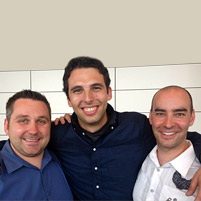Off To The Races
About the founders of Anki

Anki co-founders Hanns Tappeiner, Boris Sofman and Mark Palatucci

Anki, a robotics startup founded by Carnegie Mellon University alumni, emerged from stealth mode to announce its first product during one of the highest profile events in the tech world: the keynote of Apple's Worldwide Developers Conference, June 10 in San Francisco.
Boris Sofman, who received a Ph.D. from the Robotics Institute, led the demonstration of Anki Drive, an immersive racing game that features motorized cars with artificial intelligence.
The game goes on sale this fall, and the app is available at the iTunes Store.
Sofman co-founded the company in 2010 with fellow CMU alumni, Ph.D. Mark Palatucci and Hanns Tappeiner, who earned a master's degree in robotics. Sofman received his bachelor's degree from Carnegie Mellon and met Palatucci and Tappeiner when they all started their graduate degrees in 2005.
At its core, Anki — which means "to learn by heart" — is a robotics and artificial intelligence company. Sofman said that his Ph.D. advisers, NREC Director Tony Stentz and Associate Professor Drew Bagnell, were very supportive during their initial startup phase.
"All three of us — we're really thankful for the education we got from the Robotics Institute because the tools we used to make Anki and Anki Drive came from our background there," Sofman said. "We've always been amazed by the technology from what people are doing there, and we hope that this will be the next step in bringing technologies into people's lives. We have a great deal of respect for CMU."
The company's goal is to bring artificial intelligence into everyday experiences and consumer products. During the founders' time at Carnegie Mellon, Sofman said they worked on amazing products often related to space, agricultural or industrial technology. But as they started working on the company during school, they decided to take another tack.
"For us, an entertainment product was a fantastic way to familiarize people with the products and what they can do," Sofman said. "Racing has an appeal that's cross-generational, and the experience we're creating is very surprising and something that uses a lot of the same core technologies and building blocks that we used at Carnegie Mellon."
Anki Drive is a video game brought to life. The toy cars react to their surroundings via BlueTooth signals with Apple devices, and they use artificial intelligence to analyze the best action to take in a given situation. The sophisticated sensors and intelligent software have been likened to the technology of Google's self-driving car.
"[Apple] became really interested because they love the product, and we're using their devices in a way that no one else has done before," he said. Rather than the app serving as a remote control, Sofman said, it's the conductor behind the experience.
They've already caused enough excitement in Silicon Valley to bring in $50 million in venture capital. Recent hires will bring Anki's staff up to 35 employees. Sofman said about a quarter of them are from Carnegie Mellon, and most are from the Robotics Institute.
"When we look at Anki Drive, we see the first steps of the future of robotics and artificial intelligence being realized," Apple CEO Tim Cook said during his keynote address. "We see an entertainment experience transformed today, and we see countless possibilities in the future."
Related Links: School of Computer Science | Robotics Institute | Mashable "How Anki Achieved Every Startup's Dream of Launching at an Apple Event" | The Atlantic "Meet the Robotics Company Apple Just Anointed" | Anki on Twitter | Anki on Facebook | Anki on YouTube
